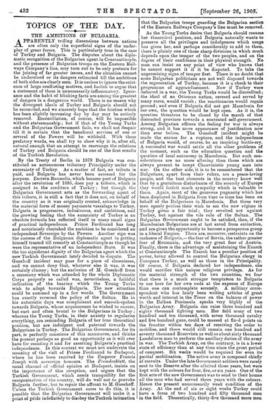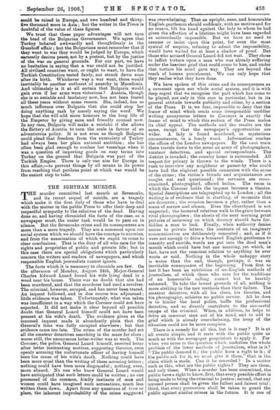TOPICS OF THE DAY.
THE AMBITIONS OF BULGARIA.
A PPARENTLY trifling dissensions between nations ra are often only the superficial signs of the under- play of great forces. This is particularly true in the case of Turkey and Bulgaria. The disputes about the diplo- matic recognition of the Bulgarian agent in Constantinople, and the presence of Bulgarian troops on the Eastern Rail- ways Company's line, may turn out to be only pretexts for the joining of far greater issues, and the situation cannot be understood or its dangers estimated till the ambitions of both sides are clearly seen. It is useless to ignore the exist- ence of large conflicting motives, and foolish to argue that a statement of them is unnecessarily inflammatory. Ignor- ance and the habit of blinking facts are among the greatest of dangers in a dangerous world. There is no reason why the divergent ideals of Turkey and Bulgaria should not be reconciled, and we sincerely hope that the friction which has been slightly increasing day by day may be entirely removed. Reconciliation, of course, will be impossible without statesmanship ; but if that of the Young Turks and the Bulgarian Government fails, we shall not despair till it is certain that the beneficent services of one or several of the Powers will be withheld. With these prefatory words, we shall try to show why it is, after all, natural enough that an attempt to rearrange the relations of Turkey and Bulgaria should be one of the first results of the Turkish Revolution.
.By the Treaty of Berlin in 1878 Bulgaria was con- stituted an autonomous tributary Principality under the suzerainty of Turkey. As a matter of fact, no tribute is paid, and Bulgaria has never been assessed for the purpose. Eastern Roumelia, which became part of Bulgaria after the revolution of 1885, does pay a tribute, which is assigned to the creditors of Turkey ; but though the 13ulgarian Government acts as the forwarding agent of this tribute, it is still a fact that it does not, on behalf of the country as it was originally created, acknowledge in the material form of money payments vassalage to Turkey. Bulgaria is progressive, industrious, and ambitious, and the growing feeling that the suzerainty of Turkey is an obsolete formula has reflected itself in many small signs of practical independence. Prince Ferdinand has long and notoriously cherished the ambition to be considered an independent Sovereign by the Powers. Another sign was the success of the Bulgarian diplomatic agent iu getting himself treated till recently at Constantinople as though he were the representative of an independent State. It was the too significant dignity of the Bulgarian agent which the new Turkish Government lately decided to dispute. The Gueshoff incident may pass for a piece of clumsiness, and we cannot deny that, whatever else it was, it was certainly clumsy ; but the exclusion of M. Gueshoff from a ceremony which was attended by the whole Diplomatic Corps properly so called was, nevertheless, a faithful indication of the bearing which the Young Turks wish to adopt towards' Bulgaria. The new situation could be summed up in a few words. The Government has exactly reversed the policy of the Sultan. He in his autocratic days was complaisant and smooth-spoken towards Bulgaria, whose acquiescence he wished to ensure, but curt and often brutal to the Bulgarians in Turkey ; whereas the Young Turks, in their anxiety to regularise everything, are reminding Bulgaria of her true theoretical position, but are indulgent and paternal towards the Bulgarians in Turkey. The Bulgarian Government., for its part, is perfectly conscious of this manoeuvre, and thinks the present perhaps as good an opportunity as it will ever have for resisting it and for asserting Bulgaria's practical independence. In this context we must not underrate the meaning of the visit of Prince Ferdinand to Budapest, where he has been received by the Emperor Francis Joseph with sovereign honours. The Fremdenblatt, the usual channel of official opinion at Budapest, insists on the importance of this reception, and argues that the Turkish Government, which needs tranquillity for the reorganisation of the country, will do well not to provoke Bulgaria further, but to repair the affront to M. Gueshoff. -Unless the Turkish Government cares to do this, it is possible that the Bulgarian Government will make it a point of pride indefinitely to disobey the Turkish intimation that the Bulgarian troops guarding the Bulgarian section of the Eastern Railways Company's line must be removed.
As the Young Turks desire that Bulgaria should resume her theoretical position, and Bulgaria naturally wants to preserve all the privileges and indulgences which usage has given her, and perhaps considerably to add to them, there is plainly one of those sharp divisions in which much depends upon the temper of the two peoples, and on the degree of their confidence in their physical strength. No man can insist on any point of view who knows that he cannot support it if it be disputed. To take the unpromising signs of temper first. There is no doubt that some Bulgarian politicians are not well disposed towards the regeneration of Turkey, because it is a check to their programme of aggrandisement. Now if Turkey were defeated in a war, the Young Turks would be discredited; the ideal of an Ottoman nation, revered and served by many races, would vanish ; the 'reactionaries would regain ground ; and even if Bulgaria did not get Macedonia for her own, the question would be kept open. As it is, the question threatens to be closed by the march of that distracted province towards a contented self-government. Among Bulgarian officers the feeling for war is always strong, and it has more appearance of justification now than ever before. The Gueshoff incident might be made the excuse for a rupture, and the independence of Bulgaria would, of course, be an inspiring battle-cry. A successful war would settle all the other problems of the moment, such as the education question and the question of local autonomy in Macedonia. But such con- siderations are no more alluring than those which are always present to tempt Chauvinistic young men into war. On the other side, it is to be remembered that the Bulgarians, apart from their rulers, are a peace-loving people, and the best elements in the country know well that by a gratuitous disturbance of the serenity of Europe they would forfeit much sympathy which is valuable to them. Again, inost of the generous pugnacity which has been displayed in Bulgaria from time to time has been on behalf of the Bulgarians in Macedonia. But these very men openly profess their wish to see the new regime in Turkey given a, fair trial ; they revolted not against Turkey, but against the vile rule of the Sultan. The Bulgarian Government ought to be satisfied, then, if the Macedonian Bulgarians are at last saved from extinction, and are given the opportunity to become a prosperous group in a liberal Empire. There are, moreover, restraints on the rashness of Bulgaria,—the fear of Servia, the rather greater fear of Roumania, and the very great fear of Austria. Finally, there is the advantage of maintaining the Exarch at Constantinople The Exarch has a peculiar position of power, being allowed to control the Bulgarian clergy in European Turkey, as well as those in the Principality. Of course, if Bulgaria declared her independence, she would sacrifice this unique religious privilege. As for the material strength of the two countries, we fear that there is a, much stronger temptation to Bulgaria to use hers for her own ends at the expense of Europe than one can contemplate serenely. A military corre- spondent who has lately been writing articles of _ great worth and interest in the Times on the balance of power in the Balkan Peninsula speaks very highly of the Bulgarian Army. Bulgaria can raise three hundred and eighty thousand fighting men. Her field army of two hundred and ten thousand, with seven thousand cavalry and five hundred guns, could be massed at fixed points on the frontier within ten days of receiving the order to mobilise, and there would still remain one hundred and seventy thousand Reservists as well as about sixty thousand Landsturm men to perform the ancillary duties of the army in war. The Turkish Army, on the contrary, is in a lower state of efficiency than at any time since the great period of conquest. Six weeks would be required for even its partial mobilisation. The active army is composed chiefly of recruits. Under the late Government soldiers were rarely sent to the Reserve after the allotted three years, but were kept with the colours for four, five, or six years. One of the first acts of the new Government was to send to their homes all the men who had served three years with the colours. Hence the present unnecessarily weak condition of the Army. At the end of six or eight weeks Turkey could have a force of two hundred and fifty thousand men in the field. Theoretically, thirty-five thousand more men could be raised in Europe, and two hundred and thirty- Ave thousand more in Asia ; but the writer in the Times is doubtful of the value of these figures.
We trust that these paper advantages will not turn the head of the Bulgarian Government. We agree that Turkey behaved awkwardly and thoughtlessly. in the Gneshoff affair ; but the Bulgarians must remember that if they went to war they would be judged by Europe, which earnestly desires peace, not by a pretext, but by the justice of . the war on general grounds. For our part, we have no hesitation in saying that a war could not be justified. All civilised countries want, or ought to want, to have the Turkish Constitution tested fairly, not struck down soon after its birth. Whichever way a war went, there would inevitably be another outburst of anarchy in Macedonia. And ultimately is it at all certain that Bulgaria would gain even if her arms were victorious ? Austria, though she is so amiable and laudatory now, has not been feared all these years without some reason. She, indeed, has so much influence over Bulgaria that she could stop her doing anything rash by merely saying the word. We hope that she will add more honours to the long life of the Emperor by giving sane and friendly counsel now. In any case, Bulgaria will make a mistake if she allows the flattery of Austria to turn the scale in favour of an adventurous policy. It is not even as though Bulgaria could plead that freedom from the suzerainty of Turkey had always been her plain national ambition ; she has often been glad enough to confess her vassalage when it was a question of importing goods on easy terms into Turkey on the ground that Bulgaria was part of the Turkish Empire. There is only one aim for Europe in this affair,—to prevent things by all means in its power from reaching that perilous point at which war would be the easiest step to take.











































 Previous page
Previous page